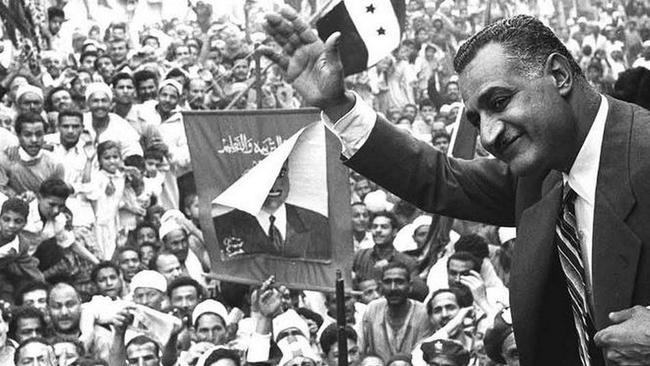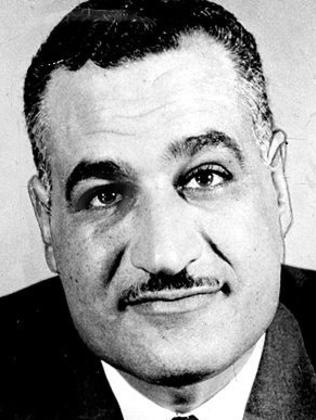Arab firebrand Gamal Abdel Nasser ended British colonialism in Egypt
IN what came to signify the end of United Kingdom’s international power, on July 26, 1956, Egyptian president Gamal Abdel Nasser seized the Suez Canal from its French and UK owners.

Today in History
Don't miss out on the headlines from Today in History. Followed categories will be added to My News.
IN what came to signify the end of United Kingdom’s international power, on July 26, 1956, Egyptian president Gamal Abdel Nasser seized the Suez Canal from its French and UK owners.
It was Nasser’s second attack on British influence in Egypt: four years earlier he had led the July 23 revolution that toppled British-backed Egyptian monarch King Farouk.
The audacious Arab rebel leader was born 100 years ago on January 15, 1918. He died on September 28, 1970, and on October 1, 1970, 48 people were trampled to death as an estimated five million people — about the same number who voted him into power — lined his funeral route.
Nasser was born in a mud-brick house on an unpaved street in the Bacos section of Alexandria, where his father was in charge of the post office. From Alexandria, Nasser’s father was transferred to Al-Khatatba, a poor and run-down Nile delta village where Nasser was first schooled. He was sent in 1925 to live in Cairo with an uncle who had been held in a British prison for political agitation in WWI. During summer holidays in 1926 Nasser learned his mother, to whom he was very attached, had died weeks earlier, but no one had dared tell him. Moving between schools in Cairo and Alexandria, he dated his revolutionary zeal to a 1930 decree that cancelled the 1923 constitution. Nasser joined student demonstrations that called for the fall of colonialism and reinstitution of the constitution.

“A general feeling of frustration and defiance swept through all those of my generation in both schools and universities and transmitted itself to the armed forces,” he later explained.
In Alexandria he joined the Misr Al Fatah Party, but left when he felt it “achieved nothing substantial”. He was approached by the Communist Party, but objected to its atheist doctrine, and also by the Muslim Brotherhood, but objected to perceived religious fanaticism.
He studied law before entering the newly created Abasseya Military College in 1936, with Zakaria Mohy El-Din and Mohamed Anwar Al Sadat, to graduate as a second lieutenant in 1938. The three were appointed at Mankabad Garrison, near Assyout in Upper Egypt.
“We went to Mankabad full of lofty ideals but we were soon disappointed,” Nasser said. “Most of the officers were incompetent and corrupt, some of my colleagues were driven to the point of resigning.”
During the 1948 Arab-Israeli War, Nasser, Sadat, El-Din and six other officers formed the clandestine Free Officers movement, drawn from the Egyptian middle classes, and began plotting to overthrow British influence. As nationalist Egyptian police officers began protecting rebel guerrilla attacks on British interests in Cairo and the Suez Canal, in January 1952 a British negotiator was killed. British forces attacked Egyptian police barracks in Ismailia, on the Suez Canal, killing 50 Egyptian officers and leaving 100 wounded. Free Officer Movement cells began riots in Cairo, leading to arsons.
“On the 26th of January 1952 Cairo tragically went up in flames and the authorities took no action,” Nasser argued in l962. “Prime Minister Al Nahhas did not leave his home in Garden City and King Farouk stayed put at Abdin Palace. Orders were not issued to the army to intervene until the afternoon, after the fire had destroyed 400 buildings, resulting in extreme losses and left 12,000 homeless.”
On July 22, 1952, Nasser led Free Officers in the Egyptian Revolution, when he and 89 other Free Officers staged an almost bloodless coup d’etat, to oust Farouk, blamed by the military for Egypt’s poor performance in the 1948 war with Israel. They also blamed Farouk and British control for the lack of progress in fighting poverty, disease, and illiteracy. At the time, fewer than 500,000 Egyptians were considered upper class and rich, four million middle class and 17 million lower class and poor. Fewer than half of primary-school-age children attended school, and most were boys. Nearly 75 per cent of people over 10 years of age, and over 90 per cent of females, were illiterate.
A Revolutionary Command Council of 11 officers controlled by Nasser, with Major General Muammad Naguib first named as leader, led Egypt until 1956. Nasser announced a constitution that made Egypt a one-party, socialist Arab state with Islam as the official religion in January. In June, 99.948 per cent of the five million Egyptians who voted elected Nasser, the only candidate, as president. The constitution was approved by 99.8 per cent of voters.
Egypt signed a secret contract with Czechoslovakia for war matériel, and Britain and the US agreed to put up $270 million to finance the first stage of the Aswan High Dam project.
On July 20, 1956, US secretary of state John Foster Dulles cancelled the US offer; and Britain followed suit.
Five days later, at a mass meeting in Alexandria, Nasser announced the nationalisation of the Suez Canal, promising the tolls Egypt collected in five years would build the Aswan dam.
Originally published as Arab firebrand Gamal Abdel Nasser ended British colonialism in Egypt


